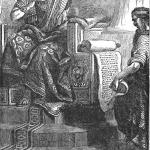
This occurred on my Facebook [public] page underneath the posting of the related article, Holding Hands at Mass During the “Our Father”. One man’s words will be in blue, and a woman’s in green. See also my in-depth treatment of the rubrics (citing many liturgical experts: which I am assuredly not): Posture During the “Our Father” Over Against the Rubrics.
*****
1 Then some Pharisees and scribes came to Jesus from Jerusalem and asked, 2 “Why do Your disciples break the tradition of the elders? They do not wash their hands when they eat.” 3 Jesus replied, “And why do you break the command of God for the sake of your tradition?…
You are not a better Christian because you do not hold someone’s hand. You are not a better Christian if you stand instead of kneel.
I’m not “complaining” about touching people. I have no objection to that. I’m an affectionate type and a “hugger.” I’m simply reporting what the rules (rubrics) say. Why is it that so many people who like the practice, make out that this is an issue merely about “touching”? It has nothing (in essence) to do with that at all in my mind (that’s incidental). It’s about following the rules of the Church or refusing to.
One should be careful the man made rules of the Church do not become what Christ complained were the rules of the church during his time.
So you flat-out reject the Church’s rubrics?
Dave, if the church says kneel one year and stand up the next, does it really matter. Why did the apostles not wash their hands if the church said it was required? When the formality becomes more important than the purpose of the Mass, then I think it becomes an issue itself.
So (let me get this straight): you’re accusing Holy Mother Church in her rubrics, of making “formality . . . more important than the purpose of the Mass”?
If people are more focused on holding hands or not. If they are focused more on what people in the group maybe kneeling, sitting or standing, then that individual is more concerned about the rubrics than the mass.
You made the issue about “the man made rules of the Church”: not people’s individual actions. Don’t change the topic. Do you accuse the Church of making “formality . . . more important than the purpose of the Mass” by having such a rule in the first place? This is not an either/or choice. The Mass is good, and so are the rubrics. They can’t be pitted against each other in a false dichotomy.
Then what was the issue with the apostles not washing their hands if the Church deemed it must occur?
That was not the Church; it had to do with the proper interpretation of the Law. You’re still dodging my question.
The church determined the law. Same authority. If as you say the church itself doesn’t stop the mass and correct the rubrics errors , then they are teaching they are secondary.
So you’re saying that because the rule isn’t enforced it’s implied that it isn’t important? If so, that doesn’t follow. The fact that a given rule or law (in a civil sense) isn’t enforced, isn’t proof that it is a bad or useless law or rule.
Do you think Christ would be upset if people held hands during a prayer or upset if they were prohibited?
I’m pretty sure that He would urge Catholics to follow the rules of their own Church, just as He said that His followers ought to do all of what even the Pharisees taught them:
Matthew 23:2-3 (RSV): “”The scribes and the Pharisees sit on Moses’ seat; [3] so practice and observe whatever they tell you, . . .”
If they were bound even to what they (not even Christians) told them (and He went on to excoriate the Pharisees for rank hypocrisy), surely, they would be all the more bound to rules of the Church. I don’t think this is rocket science.
Nice evasion of my actual question, again. Even so, I answer yours, don’t I? It’s okay to ask a question back, as long as you don’t ignore the other guy’s . . .
St. Paul talks about Church “rules” in a sense:
1 Corinthians 7:17 Only, let every one lead the life which the Lord has assigned to him, and in which God has called him. This is my rule in all the churches.
The Jerusalem Council laid down rules for the Church that determined all of subsequent history, and the Christian’s relation to Jewish Law:
Acts 15:28-29 For it has seemed good to the Holy Spirit and to us to lay upon you no greater burden than these necessary things: [29] that you abstain from what has been sacrificed to idols and from blood and from what is strangled and from unchastity. If you keep yourselves from these, you will do well. Farewell.
St. Paul then went and proclaimed this rule (made by the Church with little or no scriptural precedent) far and wide:
Acts 16:4 As they went on their way through the cities, they delivered to them for observance the decisions which had been reached by the apostles and elders who were at Jerusalem.
Now, if I were to take your attitude and that of some others in this thread, I would say, “who cares what the Church teaches about these rules? That has no bearing on my life or walk with Christ, and is legalism.”
Nope. The Church declared the rule by the guidance of the Holy Spirit and inspired Scripture declared that these decisions were “delivered” for the purpose of “observance.” They weren’t optional or up to the individual’s private judgment.
Jesus laid down the principle that one ought to listen to the Church, and if someone does not, he or she ought to be shunned:
Matthew 18:17 If he refuses to listen to them, tell it to the church; and if he refuses to listen even to the church, let him be to you as a Gentile and a tax collector.
Hebrews 13:17 Obey your leaders and submit to them; for they are keeping watch over your souls, as men who will have to give account. . . .
Yes leaders are condemned most often.
You seem to forget the seat of Moses was about the law and the Pharisee were condemned for their traditions as well. It is not the grumbling of the Church we have heard but the laity against the Church not being intolerant of people’s actions.
Jesus told His disciples to do what the Pharisees taught them. Likewise, we ought to do what the Church teaches us, in its various rules, whether it is compulsory Mass attendance on Sundays and holy days, confirmation procedures, marriage procedures, liturgical rubrics; whatever it is.
I don’t see how you are defending your case at all. Now I’ve provided several Bible passages that elucidate the principle of following Church rules, but you blow them off as well. So you appear willing to dismiss Scripture just as easily as you do Church instructions. This is not a good state of mind! I strongly urge you to ponder this matter further.
We have the opposite where the laity and some priests are in opposition to the Church not forcing people to not hold hands. The church can teach that if you hold the hand of another during prayers you are condemned by God. Simple enough.
One group views the doctrine of the Church as an authoritarian list of rules and regulations. Those who follow the rules are the “good” people. Those who do not follow the rules are the “bad” people. This is a superficial way to view the Church.
That’s a gross caricature: at least of what I am contending.
The rules of the Church exist for our good: just as with all Church teachings. Catholics follow the Church. They don’t pick and choose what they like and don’t like (“cafeteria Catholic”). If that’s your desire, you have the option to do whatever you like and be freed from as many rules as you like: as some species of Protestant.
Catholics obey the Church. They don’t completely disregard what she teaches. That’s not how the system works.
Nor did I ever say that all the Church is, is about rules and regulations. My point is that rules and regulations (considered by themselves) are not bad things. They’re for our good, just as most civil laws (apart from relatively few immoral ones) are for our good.
Many people who don’t follow the rules (on this or any rule they are aware of) do so with more or less perfect innocence. They simply haven’t been taught, and they do this (holding hands during the Our Father) with the purest of motives. Once they know the rule they are responsible to follow it, not fight it. The more knowledge we have, the more culpable we are when we disobey a known rule.
So if you know this rule and disobey it, does it follow that you are a bad, wicked person with no redeeming qualities at all? No; it follows that you are disobedient as regards this particular thing, which is a bad thing. Lots of bad things and bad habits add up to eventually being a “bad person” but that’s a long way from just whether one holds hands at Church or not.
God determines who is bad and who is damned in the end. Meanwhile, He has given us rules in the Bible and the Church and in civil society, for our good.
There are many calling for the Pope’s head as he is not following the rules as well. Of course we have many who claim the mass itself is not valid as it does not follow the ways of old. Vernacular language, the priest celebrating Mass facing the people, singing vernacular hymns, standing to receive Communion and the removal of altar rails, all illegal. Since it is the leadership in the Church that has failed to enforce the rules, we can lay blame on the culpable Church itself.
As usual, you ignore what I wrote and continue on preaching. This is a disgraceful comment for any Catholic to make.
I won’t even dignify the silly comment about the Holy Father with a reply. Saying the Mass is not valid is a schismatic position. But there are not “many” who say that. Reactionaries and some traditionalists say that the extraordinary form is “objectively superior” but not that the ordinary form is invalid. Go ask them if you don’t believe me. Only the most extreme positions, like sedevacantists, say that.
Vernacular language is permissible. The Church thought so as regards the Mass, and that is her prerogative to do, just as she has allowed vernacular translations of the Bible since Latin ceased being the universal language of much of Europe. The sky won’t fall down because a person hears the Mass said in their own language.
Facing the people is also something the Church can allow or disallow. In St. Peter’s they face the people and the altar at the same time. Receiving communion standing in the hand was the norm of the early Church for six centuries, as I have documented. Thus, allowing that now is not anti-traditional. It’s quite traditional. Eastern Catholics (as well as Orthodox) also stand (though they receive in the mouth). They stand a lot more, whereas we kneel relatively more. It goes back to one’s attitude of heart, whatever posture they use.
Vernacular hymns: so what? Altar rails is the same thing: they were not always there, or necessarily there. These things can all develop or even change, just as priestly celibacy did in the Latin rite. Holding hands can change also; currently it is not permitted.
I already agreed that there is a problem in enforcing the rule as regards the hand-holding. The rubrics seem clear, but it’s not enforced. But that’s not “the Church”; it is the local priest and individual bishops going against what “the Church” has established: the rubrics of the Mass. One priest or one bishop is not “the Church.”
You can not claim it is the responsibility of the Laity to follow rules that the teachers are ignoring themselves. Truly if God hates people holding hands because it is not stated as permissible, then those who created the rule in knowledge and ignore it after creating such restrictions, are the most at fault. Seems silly that the laity can receive wine in one part of the world and another it is prevented as they might spill it. But rules are rules, such things gave birth to Protestantism.
This is ridiculous. You consistently refuse to deal with my points. Now you are making an express attack on the Church and the pope. We’re done.
***
Our Bishop did away with kneeling years ago. We stand during the Our Father and stay standing after Communion, of course some kneel anyway. I hold hands with my husband and children, I would never reach for someone else but we’ve been holding hands for 20 years and it is very meaningful for us. It’s easy to get caught up in some things. I want to see my parish come out strong against birth control, they don’t. Abortion, they don’t, gay marriage, they don’t. But I’m supposed to get worked up about holding my loved ones hands during the Our Father? And no, leaving my parish isn’t an option when you live in tiny rural towns who have the same Bishop in an hour radius. I do miss the days of kneeling.
You don’t care what the Church rubrics are, either? That’s irrelevant to you?
I think there is truth in being more Catholic than [the] Church. I’ve seen it first hand.
So have I. I don’t see how that addresses the question of what the actual rubrics require, and whether they ought to be obeyed or not. I don’t hold hands because the Church rubrics say that I should not. Period. That is because of the Church, not “me.”
I have no objection whatever to holding hands per se. I hold hands with my wife all through church, when we are sitting, and at home on the couch (and we have been married 33 years), and when we go hiking (like yesterday), but not during the Our Father, because of what the rubrics require at a particular moment of prayer during the Mass.
I think a lot depends on location. I’d say out of the members at my parish, 99% hold hands. 10% still kneel after communion. If our Bishop said “hey folks, I want y’all to stop holding hands during the Our Father” I’m sure it would stop.
The thing is, that the rubrics are decided upon by the bishops, as far as I know; so the bishops have already spoken as to what to do.
I used to get so caught up in hold[ing] hands or not, Communion on the tongue or in the hand, kneel[ing] before and after Communion, it plagued me to the point that Mass was about “am I doing this right?” I no longer had a personal relationship with Jesus, my entire person was worried if I was looking Catholic enough. I’m a sinner and I fail every single moment of my life, I’m working on it constantly. I will never leave the church but I won’t get caught up in hand holding or not. So in answer to your question, no, I don’t care about the rubrics. I care about my salvation and that of my husband and children’s above holding or not holding hands.
Thanks for your honesty. So you have created a false dichotomy between faith and the rubrics, when in fact they are perfectly consistent with each other. Laws are not the same thing as pharisacal legalism, which is an attitude of the heart. Laws are good things. We are guided every day by them, both in society and the Church.
If we say we simply don’t care about Church rules, then that is thinking like a Protestant: a different rule of faith, where the individual ultimately reigns supreme. This led to the sad divisions in the larger Church (the company of the baptized): which is not a good thing.
Whether I hold hands or not, or kneel or not has no relation to my relationship to Jesus and my allegiance to Holy Mother Church. Zero, zip, nada, zilch.
If the Church says to not do it, I don’t. If she says to do it, I do. No relation to my walk with Jesus, other than that I ought to be obedient to all that Holy Mother Church (set up by our Lord Jesus) teaches.
***
Photo credit: wife Judy and I (Oct. 2013) I love hugs and touch. That has absolutely no relevance at all to whether Catholics should hold hands during the Our Father.
***












